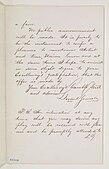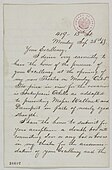Leonard Byron Grover (December 9, 1833 – March 7, 1926) was a nineteenth-century American comedic playwright, theatre manager, opera impressario, and sports promoter, best known for his association with President Abraham Lincoln.
His best known plays are Davy Crockett and Our Boarding House, believed to be the origin of the phase "make no mistake". Our Boarding House premiered to great success January 31, 1877, at the Park Theatre in Brooklyn, and was the launch of the comedy duo Stuart Robson and William H. Crane. His play Cad, the Tomboy was a big success for the actress Carrie Swain for whom he wrote that work.
Grover established his own touring company, the Grover German Opera Company, which presented Faust and Tannhäuser in New York and Philadelphia.
He also established Grover's Theatre in Washington, D.C., where President Abraham Lincoln frequently attended performances with his wife and Secretary of State William H. Seward. Grover was reported to have "saved Lincoln's life" outside the theatre; on one occasion after a performance, the president's carriage was surrounded by an angry mob and his driver was unable to move, and Grover jumped up, took the reins, and drove the president and his party to safety. He was told afterwards that the president felt he owed his life to Grover's quick thinking.
The president's son, Tad Lincoln, was attending a performance of Aladdin and the Wonderful Lamp at Grover's Theater on April 14, 1865, when his father was assassinated a few blocks away at Ford's Theatre.
In 1909, he wrote a lengthy piece for The Century Magazine titled "Lincoln's interest in the theater."
As a sports promoter, he organized the 1860 fight between English boxing champion Jem Mace and American John C. Heenan at 44 Union Square, as well as wrestling matches between Scotsman Donald Dinnie and New Yorker William Muldoon.
Grover was born in 1833 in Springwater, New York. He died in Brooklyn, aged 92.
Theatre invitations to Abraham Lincoln
Invitation to Hamlet-
 March 23, 1863, invitation to a performance of Hamlet at Grover's Theatre (front side)
March 23, 1863, invitation to a performance of Hamlet at Grover's Theatre (front side)
-
 Invitation to Hamlet (back side)
Invitation to Hamlet (back side)
-
 September 28, 1863, invitation to Othello (page 1)
September 28, 1863, invitation to Othello (page 1)
-
 Invitation to Othello (page 2)
Invitation to Othello (page 2)
-
 Invitation to Othello (page 3)
Invitation to Othello (page 3)
References
- ^ "Leonard Grover, Playwright, Dies; Saved Lincoln's Life". The Brooklyn Daily Eagle. March 8, 1926. p. 13. Retrieved March 9, 2024.
- Our boarding house [in, Davy Crockett & other plays by Leonard Grover : Frank Murdock : Lester Wallack : G. H. Jessop : J. J. Mccloskey. Edited by Isaac Goldberg and Hubert Heffner]. Proquest LLC. 2019-09-08.
- "Theatre programmes". Library of Congress.
- "America's Lost Plays".
- Partridge, Eric (2003-09-02). A Dictionary of Catch Phrases. ISBN 9781134929993.
- "Footlight Flashes". Boston Sunday Globe. August 27, 1882. p. 4.
- "Carrie Swain as "Cad, the Tomboy"". Boston Daily Globe. October 13, 1882. p. 2.
- Hutchinson, Robert J. (2020-04-07). What Really Happened: The Lincoln Assassination. Simon and Schuster. ISBN 978-1-62157-886-4.
- Grover, Leonard (1909). Lincoln's interest in the theater. The Century Company. Retrieved 10 March 2024.
This article about an American playwright is a stub. You can help Misplaced Pages by expanding it. |